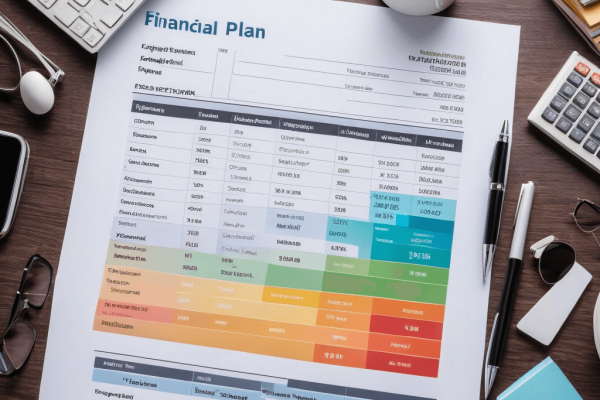Budgeting Basics are essential for anyone looking to manage their finances effectively.
By mastering the fundamentals of budgeting, you can make informed financial decisions that lead to greater savings and less stress.
In this article, we will delve into the significance of budgeting, the benefits it offers, and practical steps you can take to create and maintain a successful budget.
Whether you’re a student, a professional, or simply seeking to improve your financial health, understanding budgeting basics is the first step towards financial stability.
What is Budgeting?
Budgeting is the practice of creating a plan to manage your income and expenses. It helps individuals and families understand where their money goes each month.
By tracking your spending, you can identify areas to cut back and save for future goals.
Budgeting can include categories like housing, transportation, groceries, and entertainment.
Each month, you can compare your actual spending to your budgeted amounts.
This comparison allows for adjustments and helps ensure you stay on track.
Learning the basics of budgeting can lead to better financial choices and increased savings.
Benefits of Budgeting
Budgeting offers several benefits that can greatly improve your financial situation. First, it helps you understand your spending habits by tracking where your money goes each month. With this knowledge, you can identify areas to cut back and save more.
Second, having a budget reduces financial stress by providing a clear plan to achieve your goals, whether it’s saving for a vacation or paying off debt.
Additionally, sticking to a budget helps prevent overspending, ensuring you live within your means. This discipline can lead to increased savings and financial security over time.
Lastly, budgeting encourages setting financial goals and planning for the future, allowing you to allocate funds towards significant purchases or investments.
By understanding and applying the benefits of budgeting, you can take control of your finances and work towards a stable financial future.
How to Create a Budget
Creating a budget is a crucial step in managing your finances effectively.
To start, gather all your income sources such as your job, side hustles, or any passive income.
Then, list your fixed expenses like rent, utilities, and insurance.
After that, estimate your variable expenses, which can include groceries, entertainment, and personal care.
It’s important to review your past spending to make these estimates as accurate as possible.
Next, add up your total income and subtract your total expenses.
This calculation will show if you have a surplus or a deficit.
If you find that your expenses exceed your income, look for areas where you can cut costs.
Once you have a clear picture of your finances, create categories for your budget.
You can use a simple spreadsheet, a budgeting app, or even pen and paper.
Allocate your income to each category, ensuring that you prioritize essentials like food and housing before allocating money for savings or discretionary spending.
Regularly review your budget and adjust as needed to stay on track.
By following these steps, you’ll learn how to create a budget that works for you.
Common Budgeting Mistakes
Common budgeting mistakes can derail your financial plan. One mistake is setting unrealistic goals. If your budget is too tight, you may find it hard to stick to it. Instead, aim for goals that are achievable and allow some flexibility.
Another common error is failing to track expenses accurately. Without tracking, it’s easy to lose sight of spending habits. Make sure to record every purchase, no matter how small.
Ignoring irregular expenses is also a mistake. These occasional costs can add up. Planning for them ahead of time is essential.
Additionally, many people forget to include savings in their budget. Treat savings like a monthly expense to ensure you’re building an emergency fund.
Lastly, not reviewing your budget regularly can lead to problems. Life changes and so should your budget. By avoiding these common mistakes, you can keep your budget on track and achieve your financial goals.
Tools for Effective Budgeting
Using the right tools can make budgeting easier and more effective. First, consider a simple spreadsheet program like Microsoft Excel or Google Sheets. These tools allow you to create customized budgets and track your expenses with ease. You can set up different categories for spending, and formulas can help you automatically calculate totals.
Another useful tool is a budgeting app. Apps like Mint or You Need a Budget (YNAB) help you manage your budget on the go and send reminders for bills and spending limits.
Furthermore, using expense tracking tools like personal finance software can help you monitor your bank transactions and categorize your spending automatically. Some of these tools sync directly with your bank account, making it simpler to stay updated.
Additionally, setting calendar reminders for your bills ensures you never miss a payment, which can help maintain your budget. Lastly, consider using financial education resources, such as online courses or articles, to enhance your budgeting skills.
By utilizing these tools, you can streamline your budgeting process and achieve better financial health.
Monitoring Your Budget Progress
Monitoring your budget progress is a vital part of effective budgeting. To start, compare your actual spending against your budgeted amounts regularly. Doing this weekly or monthly helps you stay on track. Use budgeting apps or spreadsheets to track these figures easily. If you notice that you are overspending in certain categories, it’s important to make adjustments. Identify triggers for your spending habits, such as emotional spending or impulse purchases. Another good practice is to review your budget monthly to see if your financial goals are being met. This review can be a great way to celebrate your successes or identify areas for improvement.
Also, consider setting up alerts for your spending limits. Many banking apps have features that notify you when you’re approaching your budget limits. This practice keeps you informed and helps prevent overspending. Lastly, remember that flexibility is key. Life circumstances change, and your budget should adapt accordingly. Regularly monitoring your budget allows you to make informed decisions that are right for your financial situation.
Adjusting Your Budget Over Time
Adjusting your budget over time is important for staying on track with your financial goals. Life changes, such as getting a new job, moving, or starting a family, can all impact your budget. Start by reviewing your financial situation regularly. This could be monthly or quarterly. It’s essential to look at your income and expenses and identify any changes. Evaluate fixed expenses like rent or mortgage and variable expenses like entertainment and groceries. If your income increases, it may be a good time to allocate more to your savings or debt repayment. If expenses increase, you might need to cut back in other areas.
Another reason to adjust your budget is to reflect new goals. For instance, if you want to save for a vacation or a major purchase, you need to include these goals in your budget. Make sure to prioritize essentials first, then allocate funds toward your new goals. Moreover, if you find that you consistently overspend in certain categories, adjust those categories accordingly. This practice can make your budget more realistic and easier to follow.
In Conclusion: Embrace Budgeting for Financial Success
Learning the principles of budgeting is essential for anyone seeking financial stability. By understanding your income and tracking expenses, you can better manage your finances.
Remember to regularly monitor your budget and make necessary adjustments to adapt to life changes.
Utilizing tools for effective budgeting and keeping an eye on common mistakes will help you succeed in your financial journey.
Embrace the flexibility of budgeting to achieve your financial goals and secure your future.


